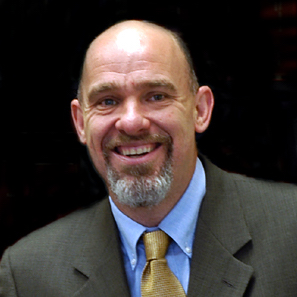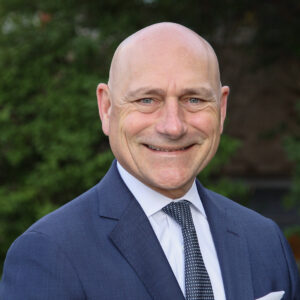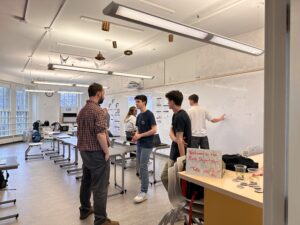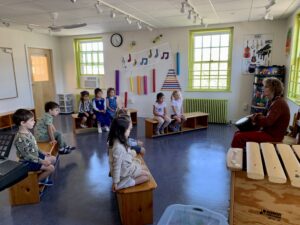Writer: Eleana Teran
 2 min read July 2023 — Boston’s primary and secondary schools create pathways for students to attend some of the world’s best colleges. In a rapidly evolving academic world, local educational institutions are setting the pace, often outdoing themselves in delivering top-notch learning. Invest: met with two schools at the forefront, the Advanced Math and Science Academy Charter School (AMSA) and the International School of Boston (ISB). Both take a unique approach to education, and through regional partnerships and programs help retain the state’s top talent.
2 min read July 2023 — Boston’s primary and secondary schools create pathways for students to attend some of the world’s best colleges. In a rapidly evolving academic world, local educational institutions are setting the pace, often outdoing themselves in delivering top-notch learning. Invest: met with two schools at the forefront, the Advanced Math and Science Academy Charter School (AMSA) and the International School of Boston (ISB). Both take a unique approach to education, and through regional partnerships and programs help retain the state’s top talent.
Both institutions are leveraging resources to provide rich, diverse educational experiences, focusing on equipping students with critical skills. Given the challenges facing the industry, schools need to continuously evolve, placing student needs at the forefront of their efforts to shape the future of Boston’s education sector.
What steps does the school take to ensure that students are prepared for the demands of the workforce and future careers?

Mark Vital, Community Outreach of AMSA School: Five years ago, we embarked on a visionary path to prepare students for the future. Recognizing that our curriculum alone wouldn’t suffice, we prioritized forging partnerships with high-tech companies. Our goal was to expose students to diverse industries and equip them with sought-after skills. One remarkable partnership we established is with IRobot in Bedford. Their comprehensive STEM program offers tools, a mini-museum, tours, job shadowing and internships — all conveniently housed in one location. Moreover, their employees visit our school to engage with our students. This collaboration is just one example among many, including Boston Scientific, Quest Diagnostics and Raytheon, known for hosting events with us. Through these exciting partnerships, our students gain exposure to a world of opportunities.
 Richard Ulffers, Head of School, International School of Boston: International programs of study like ours foster skill sets around creative thinking and empathy for other cultures and develop thoughtful, independent thinkers, all skills that the world needs now more than ever. At the same time, we also have a STEM room and an AI working group and our tenth-grade students do a three-day work observation, for example. We know students must graduate equipped with critical thinking and creative problem-solving skills that will allow them to thrive in an ever-changing world. We see the results of this work not only in the success of our alumni, but also reflected in external assessments, where ISB students regularly score exceptionally well.
Richard Ulffers, Head of School, International School of Boston: International programs of study like ours foster skill sets around creative thinking and empathy for other cultures and develop thoughtful, independent thinkers, all skills that the world needs now more than ever. At the same time, we also have a STEM room and an AI working group and our tenth-grade students do a three-day work observation, for example. We know students must graduate equipped with critical thinking and creative problem-solving skills that will allow them to thrive in an ever-changing world. We see the results of this work not only in the success of our alumni, but also reflected in external assessments, where ISB students regularly score exceptionally well.
How would you characterize the strength of primary and secondary education in the Greater Boston region?
Vital: The Massachusetts Department of Elementary and Secondary Education has been a leading force nationwide. For instance, while standardized testing may not have unanimous support, Massachusetts has the MCAS, which independent experts consider to be the most prominent standardized test used by any state. This exemplifies the high bar set by our Department of Education. They have consistently maintained rigorous standards, not only in Massachusetts frameworks but also in every subject, including English, math, science and history. These frameworks serve as roadmaps for schools to follow, guiding their curriculum and providing a basis for later assessments. We not only possess a comprehensive roadmap but we also have effective measures in place to evaluate school performance. When schools struggle, the Massachusetts Department of Elementary and Secondary Education excels in providing various resources to aid them, including financial and human resources.
 Ulffers: We are fortunate to have easy access to world-class colleges and universities and renowned research institutions. In recent years, our students have benefited from partnerships with MIT, specifically its Biobuilder engineering initiative, and through Harvard’s “Night of Ideas” with local researchers and intellectuals. We also serve as a hub for visiting speakers and seminars. Just this year we’ve hosted outside speakers covering money management, Web 3.0 challenges, and exoplanets, among other timely topics. Our school also serves as a home away from home for our global network of faculty, staff, and families, so we value our relationship with the local French community in Boston, including FACCNE, the French Library, and the Consulate General of France. Perhaps most importantly, we believe in giving back to our surrounding community, so our students participate in numerous community service initiatives at area farms, environmental institutions, food banks, and more each year.
Ulffers: We are fortunate to have easy access to world-class colleges and universities and renowned research institutions. In recent years, our students have benefited from partnerships with MIT, specifically its Biobuilder engineering initiative, and through Harvard’s “Night of Ideas” with local researchers and intellectuals. We also serve as a hub for visiting speakers and seminars. Just this year we’ve hosted outside speakers covering money management, Web 3.0 challenges, and exoplanets, among other timely topics. Our school also serves as a home away from home for our global network of faculty, staff, and families, so we value our relationship with the local French community in Boston, including FACCNE, the French Library, and the Consulate General of France. Perhaps most importantly, we believe in giving back to our surrounding community, so our students participate in numerous community service initiatives at area farms, environmental institutions, food banks, and more each year.
What challenges do you see in the region’s high-school education?
Vital: One area where I believe charter schools, including ours, need improvement is in sharing best practices with other schools. The whole concept of charter schools was to experiment with new approaches and then share successful methods with others. However, many charter schools have yet to embrace this notion and establish meaningful partnerships. It’s crucial for schools to develop these collaborative relationships, as it’s not enough for one school to possess valuable knowledge if others are unwilling to accept and implement it. Additionally, I had numerous discussions with the superintendent of public schools to explore the possibilities of sharing best practices. The same approach applied to Assabet Valley, our local technical school. It required persistent effort and advocacy to foster collaboration and knowledge exchange.
 Ulffers: Like all independent schools and nonprofits, we run a delicate balance between revenue and expenses, and all spending is focused on mission-directed efforts. We rely heavily on tuition but guided by our strategic planning, we remain focused on developing our endowment and annual fund efforts and increasing participation in giving. We also have corporate partnerships in place, such as with Dassault Systemes, which provide financial support to specific programming areas. We see this as another growth opportunity for the future.
Ulffers: Like all independent schools and nonprofits, we run a delicate balance between revenue and expenses, and all spending is focused on mission-directed efforts. We rely heavily on tuition but guided by our strategic planning, we remain focused on developing our endowment and annual fund efforts and increasing participation in giving. We also have corporate partnerships in place, such as with Dassault Systemes, which provide financial support to specific programming areas. We see this as another growth opportunity for the future.
Credit: Image via International School of Boston
For more information, please visit:
